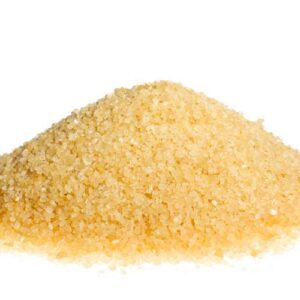Beet sugar is a type of sugar derived from sugar beets. It is a common sweetener used in various foods and beverages and is known for its clean, sweet taste. Here’s a detailed overview of beet sugar:
Production:
- Source:
- Beet sugar is extracted from the sugar beet (Beta vulgaris), a root vegetable that grows in temperate climates. The sugar beet is rich in sucrose, the same sugar found in cane sugar.
- Processing:
- Harvesting: Sugar beets are harvested from the ground and cleaned.
- Extraction: The beets are sliced and subjected to hot water extraction to dissolve the sugar. The juice is then purified and concentrated.
- Crystallization: The concentrated juice is boiled until sugar crystals form. These crystals are separated from the remaining liquid (molasses) and dried to produce granulated sugar.
- Refinement:
- Beet sugar undergoes a refining process to remove impurities and achieve a pure, white crystalline form. This process is similar to the refinement of cane sugar.
Characteristics:
- Appearance:
- Beet sugar is typically white, crystalline, and granulated, similar to cane sugar.
- Flavor:
- It has a clean, sweet flavor with no noticeable difference from cane sugar in terms of taste.
- Solubility:
- Beet sugar dissolves easily in liquids and can be used interchangeably with cane sugar in most recipes.
Nutritional Profile:
- Calories and Carbohydrates:
- Beet sugar is primarily composed of sucrose, which provides calories and carbohydrates. One teaspoon of beet sugar contains approximately 16 calories and 4 grams of carbohydrates.
- Nutritional Value:
- Beet sugar provides energy but lacks essential nutrients like vitamins and minerals. It is considered a source of “empty” calories.
Uses:
- Baking:
- Beet sugar is commonly used in baking to sweeten cakes, cookies, pastries, and other baked goods.
- Cooking:
- It can be used in savory dishes to balance flavors and add sweetness. It’s also used in sauces, dressings, and marinades.
- Beverages:
- Beet sugar is used to sweeten beverages like tea, coffee, soft drinks, and fruit juices.
- Preservation:
- It can be used in the preservation of fruits and vegetables through methods like canning and jamming.
Health Considerations:
- Moderation:
- As with all types of sugar, it’s best to consume beet sugar in moderation to avoid excessive calorie intake and potential health issues like weight gain and dental problems.
- Blood Sugar:
- Beet sugar can affect blood sugar levels similarly to cane sugar, so individuals with diabetes or blood sugar concerns should monitor their intake.
- Nutritional Balance:
- Incorporate beet sugar into a balanced diet with a focus on whole, nutrient-dense foods.
Environmental and Economic Aspects:
- Cultivation:
- Sugar beets are grown in cooler climates and can be cultivated in regions where sugar cane cannot thrive. They are often seen as a more sustainable crop compared to sugar cane in certain areas.
- Economic Impact:
- The sugar beet industry plays a significant role in the economies of countries that grow sugar beets, providing jobs and supporting agricultural economies.
Keywords:
- Beet Sugar
- Sugar Beets
- Granulated Sugar
- Sweetener
- Sucrose
- Baking Sugar
- Refined Sugar
- Sugar Production
- Sweetening Agent
- Caloric Sweetener


Reviews
There are no reviews yet.